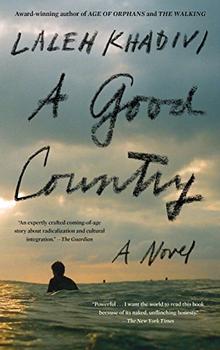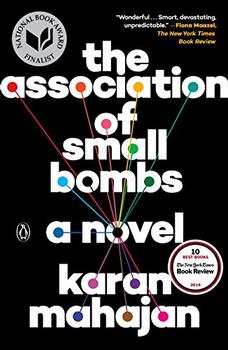Summary | Excerpt | Reading Guide | Reviews | Beyond the book | Read-Alikes | Genres & Themes | Author Bio

Following on from the success of his
2001 novel, Moth Smoke, Hamid spins The
Reluctant Fundamentalist - a stunning cautionary
tale told in just 180 pages. Although technically a
monologue (in that we hear only Changez's voice and
opinion throughout, the book takes the form of a
conversation between Changez and an unknown
American, with the reader left to extrapolate the
American's background, body language and verbal
replies from Changez's responses. This adds greatly
to the tension of the novel and also allows the
reader, for much of the book, to imagine him/herself
on the other side of the table from Changez in an
intimate little cafe somewhere in Lahore.
It's likely that some who would appreciate this book
have avoided reading it believing, from the title,
that it offers an apologia for fundamentalism. This
is not the case. In fact, it is difficult to imagine
that any well-read, balanced reader could find
anything offensive in its pages. Hamid, who attended
both Princeton and Harvard and now lives in London,
professes to feel great affection for America and
his many American friends, and writes from a
position that he believes is both critical and
loving. His character, Changez, maybe disillusioned
and out of love with America but by no stretch of
the imagination is he a fundamentalist - as defined
as someone who rigidly adheres to a set of
principles and is intolerant of the views of others.
The Reluctant Fundamentalist raises many
questions but, happily, leaves the reader to answer
most of them for his or herself. Should every
Muslim critical of America be labeled a
fundamentalist? Who is in more danger in the story -
the American or Changez? Is globalization a good
thing? Can a person from one culture ever fully
understand someone from another?
The latter is an
interesting theme explored partially through the
relationship of Changez and his boss, Jim. Jim grew
up dirt poor in America longing for what his family
had never had and, because both he and Changez
graduated from prestigious colleges as a result of
full scholarships, he sees Changez as a kindred
spirit. However, although Changez did experience a
poor boy's sense of longing while growing up, the
source of his longing was quite different to Jim's -
whereas Jim grew up aspiring to what he had never
had, Changez grew up in a family clinging on to its
good social standing, nostalgic for the wealth and
influence they had lost. Jim grew up "outside the
candy store, Changez grew up on its threshold as its
door was being shut".
Perhaps it is extrapolating
too much from the text but this reader could not
help but compare the relationship between Jim and Changez - one brought up looking forward, the other
looking back - to the gulf between America, a
country that has been built on the myth of the
American dream and is still at the top of the precarious pyramid of world power,
and many
parts of the Arab world that today enjoy a fraction
of their former power, and look back with nostalgia
on their wealthier, more influential days.
This superbly written, gripping tale is a shoo-in
for book clubs and all who enjoy being
intellectually challenged by their reading matter.
![]() This review was originally published in The BookBrowse Review in September 2007, and has been updated for the
May 2008 edition.
Click here to go to this issue.
This review was originally published in The BookBrowse Review in September 2007, and has been updated for the
May 2008 edition.
Click here to go to this issue.

If you liked The Reluctant Fundamentalist, try these:

by Laleh Khadivi
Published 2018
A timely novel about the radicalization of a Muslim teen in California - about where identity truly lies, and how we find it.

The Association of Small Bombs
by Karan Mahajan
Published 2016
The Association of Small Bombs is an expansive and deeply humane novel that is at once groundbreaking in its empathy, dazzling in its acuity, and ambitious in scope.
Your guide toexceptional books
BookBrowse seeks out and recommends the best in contemporary fiction and nonfiction—books that not only engage and entertain but also deepen our understanding of ourselves and the world around us.